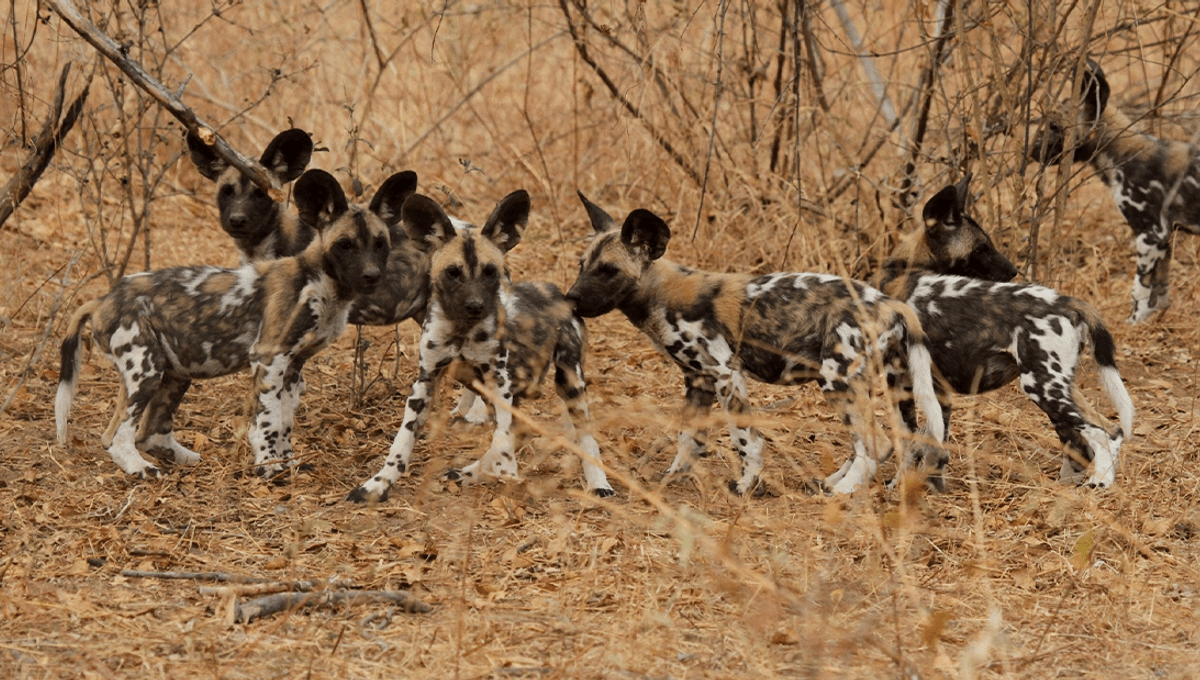
Climate change and a global rise in temperature are often synonymous with species like polar bears, who face drastic problems due to lack of sea ice at the temperature extremes in the poles. However, a new study by experts at the Zoological Society of London (ZSL) has placed African wild dogs on the brink of a population collapse, if global temperatures rise by more than 3°C (5.4°F).
By studying a population of wild dogs in Kenya for over 16 years, information about their survival and breeding has been combined into a population model to predict what might happen to this population should global temperatures continue to rise.
The team found that the tipping point for the collapse of this population was 3°C, which currently is set to happen across the world within the next 100 years. This puts populations of African wild dogs at risk of total collapse as soon as 2070.
“The collapse would be rapid. While the number of packs may initially appear stable as temperatures rise, just 1°C [1.8°F] of warming by 2070 could see the number of adult African wild dogs decline by as much as 40 percent over the next 50 years. If we reach 3°C of warming, our model predicts the total collapse of the population, and by the time we start to see populations significantly shrinking, it’ll be too late to do anything about it,” said Dr Daniella Rabaiotti, researcher at ZSL’s Institute of Zoology and lead author of the study, in a statement sent to IFLScience.
Higher temperatures limit the hunting opportunities for these wild dogs while also increasing the risk of them contracting diseases. The team thinks that under these hotter conditions, the number of pups surviving to adulthood would not be enough to replace the amount of older dogs that would be dying.
“When it’s hot, African wild dogs are less active in the day, and we think that means they are hunting less. This means they get less food, and, in the denning period when they raise pups, the pups probably get less food too. This is probably why we see fewer pups survive to adulthood when the denning period is hotter. In addition to this, in Kenya it takes longer for wild dogs to have the next litter of pups when the denning period has been hotter. On top of these impacts on reproduction, we found that adult African wild dogs in Kenya have lower survival at high temperatures,” Dr Rabaiotti told IFLScience.
While the study made use of a population in Kenya, reports suggest that other populations in Botswana and Zimbabwe could be affected in a similar way by rising temperatures. “We know that fewer pups survive to adulthood when the denning period is hotter in at least two other sites in Botswana and Zimbabwe, however, impacts on adult survival differ between sites. It’s clear that wild dog reproduction is sensitive to high temperature, and increasing temperatures will likely negatively impact their reproduction throughout their range,” continued Dr Rabaiotti.
Furthermore, African wild dogs already live in fragmented populations across their range. Previous research revealed that humans and disease spread by domestic dogs were to blame for 44 percent of African wild dog deaths and the climate crisis could be the tipping point for a species already feeling the effects of this human-wildlife conflict as well as habitat loss.
Rabaiotti added: “African wild dogs are just one species we’re set to lose, but once we’ve reached 3°C of warming, many other species will also be fighting to survive under climate change. We cannot afford to sit by and let countless species go extinct while we still have the chance to save them.”
To save this species and the many others impacted by climate change requires global action, but even small actions can make a difference.
“The most important thing we can do to help African wild dogs is to help conserve their remaining habitat by supporting conservation and community projects in the wild dogs remaining range. In addition, the usual steps to help curb our emissions will of course always be helpful – things like eating less meat, flying, and driving less, cutting your food waste, buying fewer and/or second-hand clothes, and holding world leaders and decision-makers to account in taking action against climate change,” finished Dr Rabaiotti.
The paper is published in Global Change Biology.
Source Link: African Wild Dogs Could Be Facing Total Population Collapse This Century